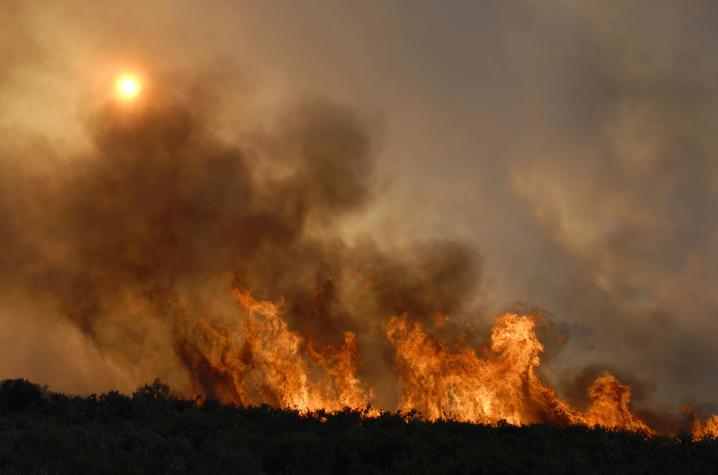How Kentuckians can protect themselves from wildfire smoke

The University of Kentucky Public Relations & Strategic Communications Office provides a weekly health column available for use and reprint by news media. This week’s column is by Jason Ballengee, D.O., an assistant professor of internal medicine at the UK College of Medicine and a pulmonary/critical care physician with UK HealthCare.
LEXINGTON, Ky. (Oct. 30, 2024) — It’s autumn in Kentucky, and sometimes that crisp fall air can come with a whiff of smoke.
We’re in the midst of Kentucky’s fall wildfire season — which annually runs Oct. 1 through Dec. 15. While the state’s fires don’t always grab headlines, they’re certainly an annual occurrence. Gov. Andy Beshear recently urged caution this wildfire season, noting that more than 1,000 wildfires burned about 48,000 acres across Kentucky last year.
Dry fallen leaves and small debris on forest floors make for easy fire fuel. While these fires can threaten life and property in the communities and forests where they’re burning, they can also cause breathing difficulties for children and adults living miles from the fire’s source.
Understanding AQI
Smoke produced by a large fire can greatly degrade local air quality. If the sky near you is looking unusually hazy or even if it is clear, it’s always a good idea to check your local Air Quality Index or AQI. The AQI gives five levels of air quality (on a scale between zero and 500). An AQI of 150 or higher means air quality is poor and unhealthy.
Poor air quality isn’t good for anyone, but those with pre-existing conditions like asthma, COPD or heart disease may be more sensitive to adverse changes in air quality and should exercise extra caution when the AQI starts to creep up. Up-to-the-minute public air quality data is easily accessible online through websites like airnow.gov and in weather apps on most smart phones.
How can wildfire smoke affect me?
Wildfire smoke can affect all individuals, however, those with pre-existing conditions may experience symptoms sooner. Common symptoms include:
- Shortness of air/breath
- Asthma attacks
- Headaches
- Fatigue
- Stinging eyes
- Scratchy throat
- Irritated sinuses
- Increased heartbeat
Ways to help protect against poor air quality:
Limiting exposure is the key to reducing the effects of breathing poor-quality air. Here are a few ways to help protect your breathing:
- Stay inside with windows closed and air conditioner running. Remember to clean/change your filters on a routine basis.
- When driving, use A/C set on recirculate to limit poor air intake.
- Limit physical activity outside when the AQI is higher than 200 (others with chronic disease may want to consider heading indoors at lower readings).
- Wear a mask, but more specifically a N95 or approved P100 respirator. Check that it has been approved by the National Institute of Occupational Safety and Health (NIOSH).
In the event of a nearby wildfire, stay aware of air quality reports as well as emergency communications from your local officials and first responders. If you begin to have symptoms, make sure you seek appropriate medical attention. Kentucky has two fire seasons, one in fall and another in spring, but remember that dangerous fire conditions can occur at any time of year.
UK HealthCare is the hospitals and clinics of the University of Kentucky. But it is so much more. It is more than 10,000 dedicated health care professionals committed to providing advanced subspecialty care for the most critically injured and ill patients from the Commonwealth and beyond. It also is the home of the state’s only National Cancer Institute (NCI)-designated Comprehensive Cancer Center, a Level IV Neonatal Intensive Care Unit that cares for the tiniest and sickest newborns and the region’s only Level 1 trauma center.
As an academic research institution, we are continuously pursuing the next generation of cures, treatments, protocols and policies. Our discoveries have the potential to change what’s medically possible within our lifetimes. Our educators and thought leaders are transforming the health care landscape as our six health professions colleges teach the next generation of doctors, nurses, pharmacists and other health care professionals, spreading the highest standards of care. UK HealthCare is the power of advanced medicine committed to creating a healthier Kentucky, now and for generations to come.




